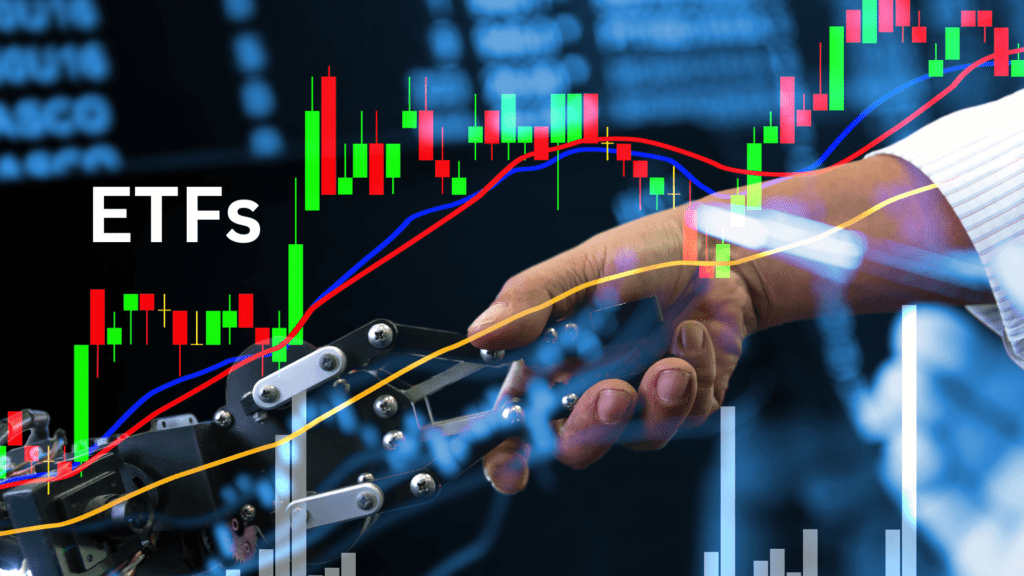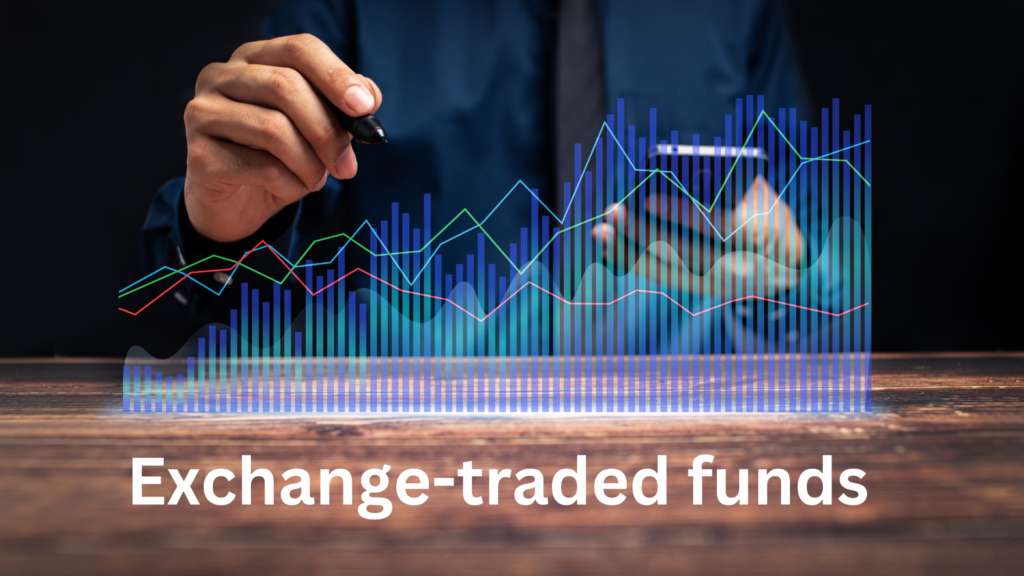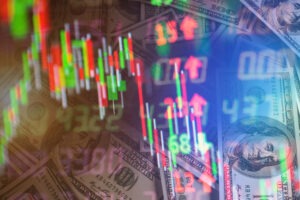What Are ETFs?
Exchange-traded funds (ETFs) are venture vehicles that combine the highlights of stocks and shared reserves. They offer broadening, liquidity, and fetched productivity, making them a favored choice for savvy financial specialists pointing to construct inactive riches. ETFs exchange on stock trades, permitting speculators to purchase and offer them all through the day, fair like standard stocks. They give an introduction to a wide range of resources, counting values, bonds, and commodities, making them an amazing alternative for portfolio diversification.

How Do Exchange-traded funds Work?
ETFs are organized to track the execution of a basic list, division, or resource course. They are overseen by proficient speculation firms that guarantee they closely take after their benchmark. Unlike shared reserves, which are, as it were, exchanged after the exchanging day, ETFs can be bought and sold at any time amid showcase hours.
Each ETF comprises a portfolio of resources, and when speculators buy offers, they are successfully buying a fragmentary interest in all the resources inside that finance. This structure permits cost-effective contributing, as administration expenses are, as a rule, lower compared to effectively overseen funds.
Types of Exchange-traded funds
Stock ETFs
These ETFs track major stock advertise files such as the S&P 500, Nasdaq, or Dow Jones. They offer moment enhancement by holding different stocks inside a single support. Speculators looking for an introduction to the stock showcase without acquiring person stocks frequently lean toward stock ETFs.
Bond ETFs
Bond ETFs contribute to diverse sorts of bonds, counting government, metropolitan, and corporate bonds. They give an unfaltering salary stream through intrigued installments and are regularly utilized by traditionalist speculators looking for lower-risk venture options.
Product ETFs
These ETFs contribute in physical commodities like gold, silver, oil, or rural items. Product ETFs permit speculators to pick up introduction to crude materials without the requirement to physically claim or store them.
Segment ETFs
Sector ETFs center on particular businesses, such as innovation, healthcare, or money-related administrations. Speculators can utilize these ETFs to capitalize on developments in specific financial sectors.
Worldwide Exchange-traded funds
International ETFs give an introduction to worldwide markets by contributing in stocks or bonds exterior an investor’s domestic nation. These ETFs offer assistance, differentiate portfolios geologically, and diminish dependence on a single economy.
Profit Exchange-traded funds
Dividend ETFs are comprised of high-dividend-yielding stocks, making them perfect for income-focused financial specialists. These ETFs disseminate profits occasionally, giving inactive wage along with potential capital appreciation.
Advantages of Contributing to Exchange-traded funds

Diversification
One of the greatest benefits of ETFs is enhancement. Since they hold different securities, the chance of losing cash due to destitute execution by a single resource is altogether reduced.
Moo Costs
ETFs regularly have lower cost proportions compared to shared stores. Since most ETFs are inactively overseen, they have negligible working costs, making them cost-effective for long-term investors.
Liquidity
Since ETFs exchange on major stock trades, they can be bought and sold all through the exchanging day. This liquidity gives adaptability for financial specialists who need to respond rapidly to showcase movements.
Assess Efficiency
ETFs have an interesting charge structure that decreases capital picks up charge compared to common stores. Speculators can hold ETFs for amplified periods without activating expansive assess liabilities.
Transparency
Most ETFs unveil their property day by day, guaranteeing that speculators continuously know what resources they are holding. This level of straightforwardness makes a difference in making educated speculation decisions.
How to Contribute to Exchange-traded funds
Select a Brokerage Account
To contribute to ETFs, you require a venture account with a brokerage firm. Numerous online brokerages offer commission-free ETF exchanging, making it available for retail investors.
Inquire about and Select Exchange-traded funds
Identify ETFs that adjust with your money-related objectives and hazard resilience. Consider components such as cost proportions, verifiable execution, and fundamental resources when making a decision.
Put a Trade
Once you’ve chosen an ETF, arrange a purchase through your brokerage account. You can select between advertised orders (buying at the current cost) or restrained orders (buying at an indicated price).
Screen and Rebalance
Periodically audit your portfolio to guarantee it remains adjusted with your budgetary objectives. Rebalancing makes a difference in keeping up the craved resource allotment and optimizing performance.
Common Exchange-traded funds Techniques for Detached Investors
Purchase and Hold
Long-term speculators buy ETFs and hold them for a long time, permitting their speculations to develop over time. This procedure minimizes exchanging costs and capital picks up taxes.
Dollar-Cost Averaging (DCA)
DCA includes contributing a settled sum in ETFs at normal interims, diminishing the effect of showcase changes. This methodology makes a difference in collecting riches over time while overseeing risk.
Core-Satellite Approach
This technique includes utilizing broad-market ETFs as the “center” holding, including sector-specific or topical ETFs as “satellites” to upgrade returns.
Risks of Exchange-traded funds Investing
Showcase Volatility
ETFs are subject to showcase changes, meaning their esteem can rise or drop depending on financial conditions.
Following Error
Some ETFs may not superbly duplicate the execution of their fundamental file due to expenses and operational inefficiencies.
Liquidity Issues
While major ETFs are exceedingly fluid, a few specialty ETFs may have lower exchanging volumes, making them harder to offer at craved prices.
Conclusion
ETFs are a flexible and cost-effective speculation vehicle for building long-term riches. Their adaptability, assess proficiency, and liquidity make them an appealing choice for both fledgling and experienced financial specialists. By consolidating ETFs into your speculation technique, you can accomplish expansion, minimize dangers, and develop your riches inactively over time.
FAQs
Are ETFs way better than common funds?
ETFs regularly have lower expenses, superior assess proficiency, and more adaptability than common stores, but the best choice depends on your speculation style.
Can I lose cash contributing to Exchange-traded funds?
Yes, like all speculations, ETFs are subject to advertising dangers and cost fluctuations.
How do ETFs create income?
ETFs can create wages through profits, intrigued from bonds, or capital appreciation.
Do ETFs pay dividends?
Yes, dividend-paying ETFs disseminate pay to speculators based on the fundamental holdings.
What is the best ETF for beginners?
Broad-market ETFs like the S&P 500 ETF (SPY or VOO) are great alternatives for tenderfoots due to their broadening and solidness.




Normally I do not read article on blogs however I would like to say that this writeup very forced me to try and do so Your writing style has been amazed me Thanks quite great post